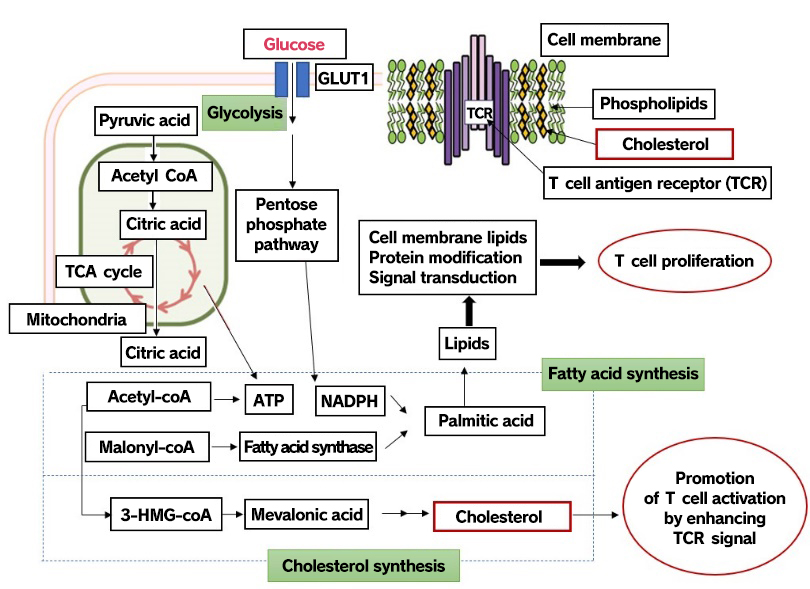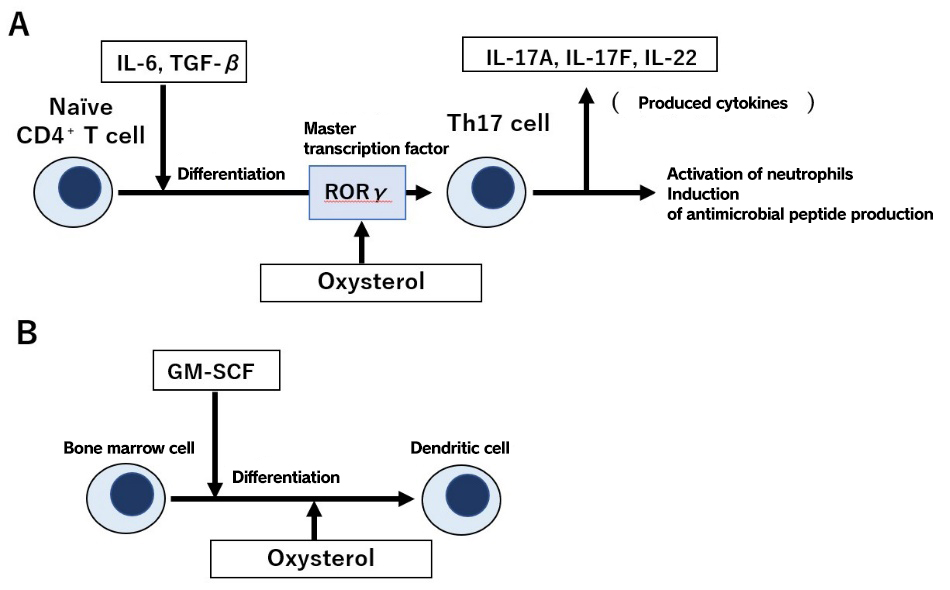|


Cholesterol affects the immune system through various mechanisms of action. The immune system is composed of innate immunity and acquired immunity. Macrophages and dendritic cells fulfill a central role in innate immunity. The function of these cells is to activate the acquired immune system through activation by microorganism-related molecules, host-derived endogenous molecules, and food-derived molecules. The mechanism of macrophage foaming and inflammation induction in hypercholesterolemia is well known. When oxidized low density lipoprotein (LDL) is deposited on the wall of a blood vessel, macrophages internalize the LDL via scavenger receptors, which in turn leads to foaming. Oxidized LDL binds to toll-like receptor 4 (TLR4) and scavenger receptor CD36 on the cell surface. Signal transduction through these receptors provokes an inflammatory response. There is further amplification of intracellular cholesterol accumulation and promotion of foaming. TLR4 is a receptor that recognizes the components of pathogens and fulfills a frontline protective role in the innate immune system. In other words, although some cholesterol most likely assists in inducing an immune response to infections, the accumulation of cholesterol exacerbates diseases associated with chronic metabolic inflammation, including atherosclerosis and obesity.

Cholesterol is also an important molecule in immunometabolism, which is a dynamic crosstalk between the immune system and the metabolic processes of living organisms. It is becoming clear how immunometabolism affects cell function in T cells, which play a central role in the acquired immune system. In CD8-positive T cells, which serve an important function in the elimination of cancer cells and virus-infected cells, intracellular cholesterol synthesis is important for early cell activation. Therefore, it has been reported that cell activation is enhanced by adding cholesterol to the culture system of CD8-positive T cells [Yang W et al. Nature 2016] (Fig. 1). Conversely, it has been reported that many cancer tissues have a high cholesterol concentration due to the hypermetabolism of cancer cells, and there is also a high cholesterol concentration in the CD8-positive T cells infiltrating the cancer tissue. Furthermore, there are reports indicating that there is a high expression of inhibitory receptor PD-1 in CD8-positive T cells and that the cancer tissue is therefore in an immunosuppressive environment [Ma X et al. Cell Metab. 2019]. Furthermore, mouse models have shown that administration of the cholesterol synthesis inhibitor simvastatin to tumor sites can reduce PD-1-expressing T cells and reduce tumor size. These findings suggest the possibility that tumor immunity can be enhanced by controlling cholesterol concentration.

Together with CD8-positive T cells, CD4-positive T cells also play an important role in the acquired immune system. CD4-positive T cells are broadly classified into effector T cells (Th1, Th2, Th17 cells) and regulatory T cells. Of these cells, Th17 cell differentiation involved in bacterial infection protection is promoted by oxidized cholesterol. Oxidized cholesterol is required for activation of the master transcription factor ROR gamma, which induces Th17 cell differentiation (Fig. 2A). Our research group has also found that oxidized cholesterol induces dendritic cell differentiation (Fig. 2B). In this way, cholesterol and oxidized cholesterol are important for maintaining the immune system; however, excess amounts will promote an inflammatory response. Conversely, research suggests that certain vegetable oils and fats have a cholesterol-lowering effect. These findings indicate that the control of biological metabolism by vegetable oils and fats may lead to the control of immune response. Further research in this field is expected in the future.
|